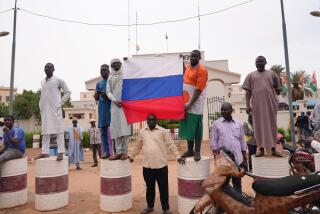North-South Split Still Bedevils Nigeria
- Share via
LAGOS, Nigeria — When army officers tried recently to overthrow Nigeria’s government, their battle cry renewed a conflict that has bedeviled Nigeria since independence: the coexistence of a relatively wealthy, largely Christian south and a poorer, mainly Muslim north.
For Africa’s most populous nation, which sits at the confluence of Christianity and Islam on the continent, the relation of its two halves has long been a source of tension and violence.
The middle-ranking officers who launched the April 22 uprising sought to expel the five powerful northern states from the 21-state federation. They claimed that the north, which has had a dominant position in politics since independence in 1960, is exploiting the rest of the country.
Military sources said 30 people were killed in fighting around the military headquarters and national radio station. President Gen. Ibrahim Babangida, who seized power in a coup in 1985, escaped and remains in power.
He responded to coup plotters’ charges that he planned to install himself as life president by promising a transition program to return power to civilians by 1992.
Though few Nigerians answered the coup leaders’ radio appeal for support, for a few hours the rebels held the floor on state radio. In addition to complaining about northern domination, they accused the government of corruption and said its austerity program is meant to enrich military commanders.
Nigeria’s media, probably the freest in black Africa, ridiculed rebel charges that the government has been sadistic in carrying out austerity measures.
But no newspaper denied the allegation of an unfair distribution of wealth and development between the verdant, oil-rich south and the arid, agriculture-based north. Oil produces more than 90% of Nigeria’s foreign currency earnings; the north, at the edge of the Sahara Desert, produces mainly meat and yams, the Nigerian staple.
“They drain our wealth with their corruption and nepotistic patronage just like that oil line rushes our oil from the south to the north,” one southern businessman said.
“We always have petrol shortages in the south. But you never hear of cars queuing for petrol in the north,” he added. He asked that his name be withheld.
“The asymmetry in the production and sharing of the national wealth has never been so prominently highlighted,” commented the magazine This Week. “Sharing of the national burden as well as the national booty must be done with some modicum of fairness.”
Coup leaders complained about the removal from the Cabinet in January of two leading southerners, Defense Minister Lt. Col. Domkat Bali and Internal Affairs Minister John Shagayi. Babangida assumed command of defense and internal security, leaving no southerners in key positions and inviting charges that his Cabinet is heavily weighted in favor of northern Muslims.
Similar fears of domination led to the coup and countercoup of 1966 that erupted into the 1967-70 Biafran War. At least half a million civilians and 100,000 soldiers died when easterners tried to secede from the federation. The easterners, who like other southerners mainly practice Christianity and traditional religions, had accused northerners of dominating the nation.
Had the latest coup attempt succeeded, the result could have been another civil war in this country of 100 million, wrote columnist Richard Akinnola in the independent Vanguard newspaper.
Most northerners speak Hausa or Fulani, while Yoruba is the main language in the south and Ibo in the east. English rule brought the three disparate groups together. The northerners have tended to hold power because the Yorubas and Ibos remain split.
Every attempt at an election has mirrored the friction between the groups. Even the holding of a reliable census has been unattainable since independence, since each group claims to be in the majority.
More to Read
Sign up for Essential California
The most important California stories and recommendations in your inbox every morning.
You may occasionally receive promotional content from the Los Angeles Times.












